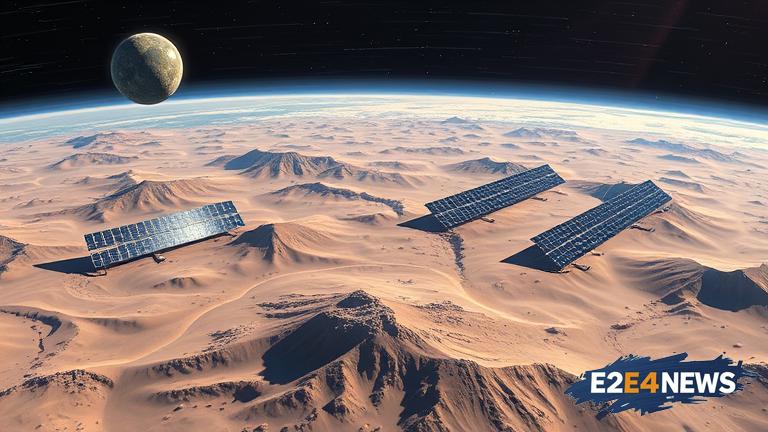The threat of asteroids colliding with Earth is a persistent concern for astronomers and scientists worldwide. In a bid to enhance our planetary defense systems, a scientist has suggested an innovative approach: utilizing solar farms in space to aid in the detection of potentially hazardous asteroids. This concept, although still in its infancy, has sparked interest and debate within the scientific community. The idea revolves around leveraging the vast energy-gathering capabilities of solar farms to power advanced asteroid detection systems. By positioning these solar farms in strategic locations around the Sun, scientists could potentially harness the energy needed to operate sophisticated sensors and telescopes designed to identify and track asteroids. This approach could significantly improve our ability to detect asteroids, especially those that are too small or too distant to be identified by current ground-based telescopes. The use of solar farms in space could also provide a sustainable and renewable source of energy, reducing reliance on traditional fossil fuels and minimizing the environmental impact of asteroid detection efforts. Furthermore, the deployment of solar farms in space could pave the way for the development of other space-based technologies, such as advanced propulsion systems and in-orbit manufacturing facilities. The scientist behind this proposal emphasizes the importance of exploring innovative solutions to address the asteroid threat, highlighting the need for a multi-faceted approach that combines cutting-edge technology with international cooperation and collaboration. As the world continues to grapple with the challenges posed by asteroids, the concept of using solar farms in space to aid in detection efforts offers a promising avenue for exploration. With the potential to enhance our understanding of the asteroid population and improve our ability to predict and prevent collisions, this idea is sure to garner significant attention and interest in the coming years. The development of solar farms in space could also have far-reaching implications for the field of astronomy, enabling scientists to study the universe in unprecedented detail and gain new insights into the formation and evolution of our solar system. In addition to their potential role in asteroid detection, solar farms in space could also be used to support a wide range of scientific missions, from the study of dark matter and dark energy to the search for extraterrestrial life. As scientists continue to explore the possibilities offered by solar farms in space, it is clear that this technology has the potential to revolutionize our approach to asteroid detection and planetary defense. The use of solar farms in space could also facilitate the development of new technologies, such as advanced solar panels and energy storage systems, which could have a profound impact on our daily lives. Moreover, the deployment of solar farms in space could help to drive innovation and economic growth, creating new opportunities for industries and entrepreneurs alike. In conclusion, the proposal to use solar farms in space to aid in asteroid detection efforts represents a significant step forward in our quest to understand and mitigate the asteroid threat. As scientists and engineers continue to develop and refine this technology, it is likely that we will see major breakthroughs in the field of asteroid detection and planetary defense. With its potential to enhance our understanding of the universe and improve our ability to predict and prevent collisions, the concept of using solar farms in space is an exciting and promising area of research that is sure to garner significant attention in the years to come. The scientist’s proposal has sparked a lively debate within the scientific community, with many experts weighing in on the potential benefits and challenges of using solar farms in space for asteroid detection. While some have expressed enthusiasm for the idea, others have raised concerns about the technical and logistical challenges involved in deploying and maintaining solar farms in space. Despite these challenges, the concept of using solar farms in space to aid in asteroid detection efforts remains a compelling and innovative solution to a pressing global problem. As the world continues to navigate the complexities of asteroid detection and planetary defense, it is clear that the development of solar farms in space will play a critical role in shaping our approach to these challenges. The use of solar farms in space could also have significant implications for the field of space exploration, enabling scientists to study the universe in unprecedented detail and gain new insights into the formation and evolution of our solar system. In the coming years, it is likely that we will see major advancements in the development of solar farms in space, as scientists and engineers continue to push the boundaries of what is possible. With its potential to enhance our understanding of the universe and improve our ability to predict and prevent collisions, the concept of using solar farms in space is an exciting and promising area of research that is sure to garner significant attention and interest in the years to come.
